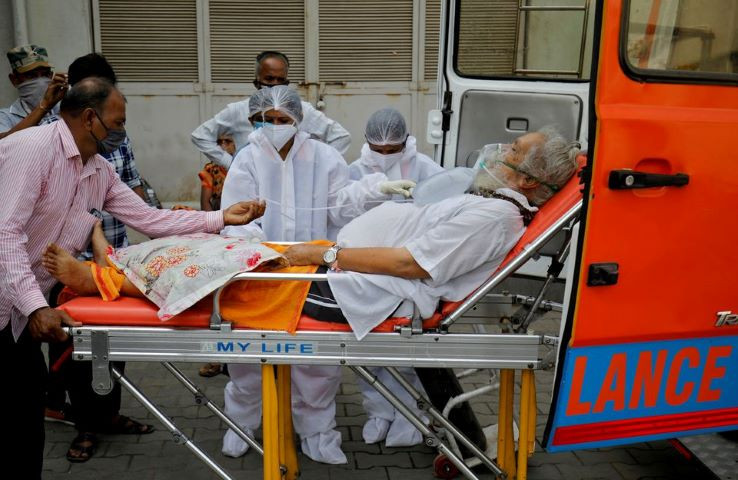
Vital medical supplies reach India as Covid deaths near 200,000
India has an official tally of 17.64 million infections, experts believe real number runs higher
Vital medical supplies began to reach India on Tuesday as hospitals starved of life-saving oxygen and beds turned away coronavirus patients, and a surge in infections pushed the death toll close to 200,000.
A shipment from Britain, including 100 ventilators and 95 oxygen concentrators, arrived in the capital New Delhi, though a spokesman for Prime Minister Boris Johnson said Britain had no surplus Covid-19 vaccine doses to spare.
France is sending eight large oxygen-generating plants this week while Ireland, Germany and Australia are dispatching oxygen concentrators and ventilators, an Indian foreign ministry official said, underlining the crucial need for oxygen.
US President Joe Biden reaffirmed US commitment to helping India, saying he was expecting to send vaccines there while senior officials from his administration warned that the country was still at the "front end" of the crisis.
India's first "Oxygen Express" train pulled into New Delhi, laden with about 70 tonnes of oxygen from an eastern state, but the crisis has not abated in the city of 20 million people at the epicentre of the world's deadliest wave of infections.
"The current wave is extremely dangerous and contagious and the hospitals are overloaded," said Delhi Chief Minister Arvind Kejriwal, adding that a large public area in the capital will be converted into a critical care hospital.
With frustration mounting, relatives of a recently deceased Covid-19 patient assaulted staff with knives at a hospital in the southeast of New Delhi, injuring at least one person, a hospital spokeswoman said.
A video posted on social media showed several people brawling with guards at the same hospital. Delhi High Court has advised local authorities to provide security at hospitals.
The World Health Organization said it was working to deliver 4000 oxygen concentrators to India, where mass gatherings, more contagious variants of the virus and low vaccination rates have sparked the second major wave of contagion.
With vaccine demand outstripping supply in the country of 1.3 billion people, two US drugmakers have offered support.
Gilead Sciences said on Monday it would give India at least 450,000 vials of its antiviral drug remdesivir. Merck & Co said on Tuesday it was partnering with five Indian generic drugmakers to expand production and access to its experimental COVID-19 drug molnupiravir.
India is also negotiating with the United States, which has said it will share 60 million doses of AstraZeneca's Covid-19 vaccine with other countries. A senior official participating in the talks said Prime Minister Narendra Modi had been assured of priority for India.
Supply uncertainty could force Maharashtra, India's hardest-hit state, to postpone inoculations for people aged between 18 and 45, a government official said.
Biden said he had spoken on Monday at length with Modi, including about when the United States would be able to ship vaccines to India, the world's second-most populous country, and said it was his clear intention to do so.
MOUNTING TOLL
India's 323,144 new cases over the past 24 hours stood below a worldwide peak of 352,991 hit on Monday, and 2,771 new deaths took the toll to 197,894.
But the fewer confirmed infections were largely due to a drop in testing, according to health economist Rijo M John of the Indian Institute of Management in Kerala, a southern state.
"This should not be taken as an indication of falling cases, rather a matter of missing out on too many positive cases," he said on Twitter.
The US State Department's coordinator for global Covid-19 response, Gayle Smith, warned India's challenge will require a sustained effort: "We all need to understand that we are still at the front end of this. This hasn't peaked yet."
Dr K. Preetham, an administrator at the Indian Spinal Injuries Centre, said patients there were having to share oxygen cylinders because of the oxygen shortage.
New Delhi is in lockdown, as are the southern state of Karnatika and Maharashtra, where the country’s financial capital Mumbai is situated.
An uneven patchwork of restrictions, complicated by local elections and mass gatherings such as the weeks-long Kumbh Mela, or pitcher festival, could trigger Covid-19 breakouts elsewhere.
About 20,000 devout Hindus gathered by the Ganges river in the northern city of Haridwar on the last auspicious day of the festival for a bath they believe will wash away their sins.
"We believe Mother Ganga will protect us," said a woman on the riverbank, where people bathed with few signs of physical distancing measures.
India has turned to its armed forces for help with the pandemic. Even China, which is locked in a military standoff with India along their disputed Himalayan border, said it was trying to get medical supplies to its neighbour.
In some cities, bodies were being cremated in makeshift facilities in parks and parking lots. Television channels showed bodies crammed into an ambulance in the western city of Beed as modes of transport ran short.
SUPPLY UNCERTAINTY
India has converted hotels and railway coaches into critical care facilities to make up for the shortage of beds, but experts say the next crisis will be a lack of healthcare professionals.
Companies ranging from conglomerates such as Tata Group and Reliance Industries Ltd to Jindal Steel and Power have stepped forward to help supply medical oxygen.
The US Chamber of Commerce has said India’s economy, the world’s sixth largest, could falter because of the spike in infections, creating a drag for the global economy.
Australia halted direct passenger flights from India until May 15, joining other nations taking steps to keep out more virulent variants of the virus.
India has an official tally of 17.64 million infections, but experts believe the real number runs much higher.















COMMENTS (1)
Comments are moderated and generally will be posted if they are on-topic and not abusive.
For more information, please see our Comments FAQ